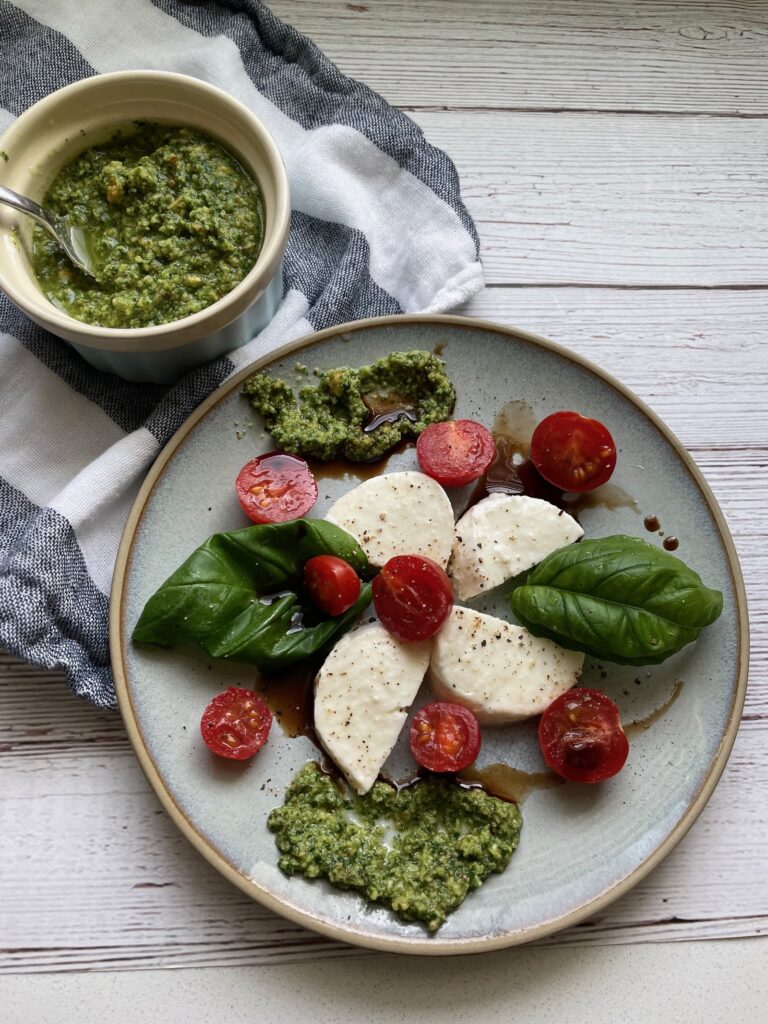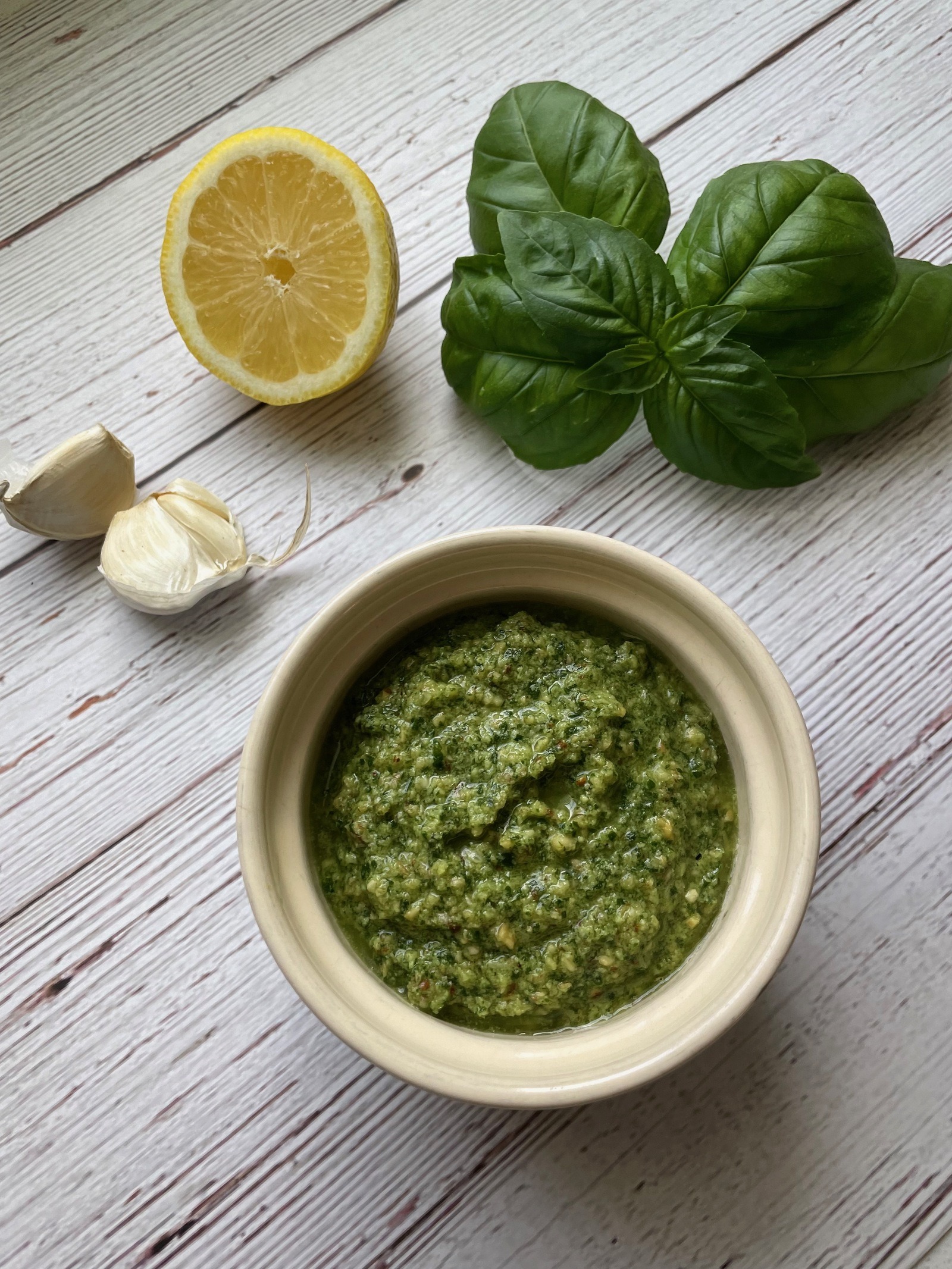Types of Pesto
With all the pesto recipes, a household classic is the Genovese style basil pesto. Nothing is better than a homemade basil pesto. And I happened to make my version a vegan basil pesto. Traditional Genovese style pesto uses pine nuts, but pine nuts are considerably more expensive than almonds, walnuts, and other nuts that I tend to have in my pantry.
My philosophy in cooking at home is to use what you have. Since I did not have the traditional ingredients, my basil pesto recipe is a variation of the traditional basil pesto. I love making basil pesto with almonds because of the richness of the almond. But you can make basil pesto with pine nuts or even a mixed nuts blend. Just avoid using walnuts because they leave a bitter flavor.
Is vegan basil pesto as good as the original?
As I was freezing my pesto, I noticed that it had a better texture if I did not add cheese. Later, I would defrost the pesto and FORGET to put the Parmigiano Reggiano.
To my surprise, this basil sauce recipe was still very delicious. So that’s how I came up with this vegan basil pesto recipe. Cheers to happy accidents! Of course, if you are an avid cheese lover, definitely feel free to add the cheese. But I think that this recipe for basil pesto holds its own even without the cheese. Try it and decide for yourself.
How to Make Pesto
I love love love pesto of all kinds. You can make many types of pesto out of any nut and aromatic herb/vegetable combination with some oil. Some even use kale and spinach, but let’s not go too far off-base, okay? Whichever vegetable you choose to be the main flavor of your pesto, make sure it’s aromatic and tasty. That is why I wouldn’t use spinach or kale.
How to preserve basil pesto?
I hate it when my pesto turns brown due to oxidation from exposure to air. This is the same process that turns your cut apples and avocados brown. A quick tip is that I use a good splash of lemon juice in my pesto recipe to prevent browning. Not only does the lemon juice preserve the vibrant green color of the basil, it also adds a note of brightness that uplifts the pesto and rounds out its symphony of flavors. You’ll be making basil pesto with lemon from now on.
Place into a sealed container and cover the surface with plastic wrap, making sure the plastic wrap touches the full surface of the pesto and gets rid of the air.
Can you freeze basil pesto? Yes! Place it in your freezer and you’ll always have pesto ready to go for yummy Italian recipes. Add cheese after defrosting if desired.
- Aromatic Vegetables/Herbs: Basil, Cilantro, Parsley, Roasted Red Peppers, sundried tomatoes, garlic

- Nuts: pine nuts, almonds, pecans, hazelnuts (avoid walnuts because they leave a bitter taste)
- oil: extra virgin olive oil or other kind of oil

- Seasoning: salt, pepper

- Optional (cheese): Parmigiano Regianno, Pecorino Romano, or other hard aged cheese
How long does basil pesto last?
Basil pesto can last up to 1 week in the refrigerator without preservatives. You can extend its life by freezing it and defrosting when you need it.
Making pesto: mortar and pestle vs food processor
I know that the authorities on authentic pesto would absolutely say that you must use a mortar and pestle. There’s speculation about how using a food processor breaks up the cells of the ingredients a little too much, resulting in less flavor.
But let’s be real for a moment: ain’t nobody got time for that! Sacrilegious much? I say use whatever tools you have on hand to get the job done: blender, food processor, knife and cutting board.
Make the delicious pesto and move on with your life! Also, I’ve tried both methods and I haven’t noticed a huge difference either way.
The only difference is my hands are throbbing from the pounding and gripping after grinding it by hand. It’s the food processor for me.

What to eat with Pesto?
Make a simple appetizer with ooey gooey burrata cheese, splashed with balsamic vinegar, and served with heirloom baby tomatoes.
Make a basil pesto for pasta. Heat the basil pesto up in a sauce pan with some cream, then mix with veggies and protein of your choice, and you’ve got a simple and quick dinner!
Use it as a sauce for pizza with chicken, sun-dried tomatoes, and mozzarella cheese.
Use the basil pesto as a base for a vinaigrette. Add some vinegar, sugar, and, and presto! You’ve got a vinaigrette made of pesto.
Mix it with mayonnaise to create a delicious aioli for sandwiches.
No judgment here: just eat it by the spoonful.
Cooking with the seasons
We have basil available all year round now due to outsourcing of our food all around the world. However, the best time to make basil is arguably in the summer, which is its season. Summertime brings about one of my favorite food seasons. I love the basil, the tomatoes, the berries, the melons….oh my goodness, the sweet sweet nectar of perfectly ripe yellow fuzzy peaches. Summertime usually means grilling, salads, and all things fresh to contrast the hot weather. I love home-cooking and home-made anything, especially when the recipe is quick and easy.
For more summertime recipes:
Vietnamese spring rolls
Thai papaya salad
Deconstructed peach crisp.
Price Comparison $$
Buying a jar of pesto will cost you anywhere between $6-12, depending on its quality. And, to be honest, there are very few good pre-made pestos out there because they oxidize quickly or they are too salty or oily. It tastes sooooo much better when you make it fresh. Trust me on this one. Jarred tomato sauces are usually fine, but you want to make pesto on your own.
Let’s see how much it cost me for my batch: 1 bunch fresh basil ($3 – $5), handful of almonds ($1), lemon ($.50), 2 cloves garlic ($.06), 1/2 cup oil ($.50).
Store Bought ($6 – 12) vs. Homemade ($5 – 8). The price really varies based on where you buy your basil pesto, but there is no beating the flavor of a homemade recipe for basil pesto sauce. Its freshness and cleanness are unbeatable. Make it yourself and see if you notice a difference!

Vegan Almond Basil Pesto
Ingredients
Method
- Place basil, garlic, lemon juice, almonds, and olive oil into a food processor and allow the mixture to blend until it becomes a smooth paste. You may need to mix things up with a spoon to get the mixture going.
- Drizzle more oil if necessary
- Season with salt and pepper to taste





2 thoughts on “Easy Vegan Basil Pesto”